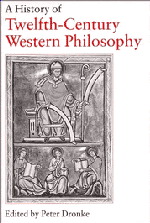Book contents
- Frontmatter
- Contents
- Preface
- Contributors
- List of abbreviations
- Introduction
- I Background
- II New Perspectives
- III Innovators
- 9 Anselm of Canterbury
- 10 Peter Abelard
- 11 William of Conches
- 12 Gilbert of Poitiers
- A note on the Porretani
- 13 Thierry of Chartres
- 14 Hermann of Carinthia
- IV The Entry of the ‘New’ Aristotle
- Bio-bibliographies
- General Bibliography
- Index of Manuscripts
- General Index
9 - Anselm of Canterbury
Published online by Cambridge University Press: 01 June 2011
- Frontmatter
- Contents
- Preface
- Contributors
- List of abbreviations
- Introduction
- I Background
- II New Perspectives
- III Innovators
- 9 Anselm of Canterbury
- 10 Peter Abelard
- 11 William of Conches
- 12 Gilbert of Poitiers
- A note on the Porretani
- 13 Thierry of Chartres
- 14 Hermann of Carinthia
- IV The Entry of the ‘New’ Aristotle
- Bio-bibliographies
- General Bibliography
- Index of Manuscripts
- General Index
Summary
The details of Anselm's life and career are fairly well known to us on account of the De vita et conversatione Anselmi Archiepiscopi Cantuariensis and the Historia novorum written by his English secretary and disciple Eadmer. We know that Anselm was born near Aosta in 1033, left Italy at the age of twenty-three, and eventually settled at the Benedictine abbey of Bec in Normandy in 1059. To Bec he had been attracted by the reputation of Lanfranc, the prior of the abbey and master of its school, and in 1060 he formally entered the novitiate. Thereafter Anselm's rise to ecclesiastical distinction was rapid: he became Prior of Bec on Lanfranc's departure to Caen in 1063, and Abbot after the death of Herluin in 1078. Finally he moved to England in order to succeed Lanfranc in the archbishopric of Canterbury, a position which he occupied until his death in 1109.
Among the external circumstances of Anselm's life, it is perhaps his association with Lanfranc which had the greatest influence upon the formation of his philosophical mentality. However, despite the praise bestowed upon Lanfranc for his intellectual abilities in Eadmer's Vita and the obvious fact that he must have exercised considerable personal magnetism as a teacher to have convinced the young Anselm that he should settle at Bec, the extent of Lanfranc's influence over his younger contemporary has only been revealed by the most modern scholarship.
- Type
- Chapter
- Information
- A History of Twelfth-Century Western Philosophy , pp. 255 - 278Publisher: Cambridge University PressPrint publication year: 1988
- 3
- Cited by

